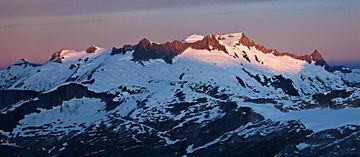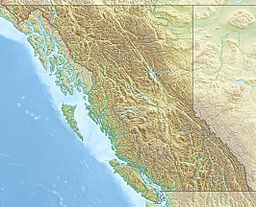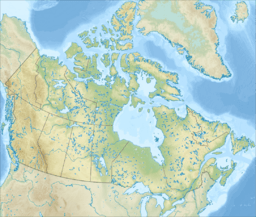Mount Albert (Canada) facts for kids
Quick facts for kids Mount Albert |
|
|---|---|

Mount Albert, northeast aspect
|
|
| Highest point | |
| Elevation | 2,552 m (8,373 ft) |
| Prominence | 1,196 m (3,924 ft) |
| Parent peak | Mount Tinniswood (2606 m) |
| Listing | Mountains of British Columbia |
| Geography | |
| Location | British Columbia, Canada |
| Parent range | Coast Mountains |
| Topo map | NTS 92/J04 |
| Climbing | |
| First ascent | 1929 Arthur Dalton, Percy Williams Easthope |
Mount Albert is a very tall mountain in the Coast Mountains of British Columbia, Canada. It stands about 2,552 meters (8,373 feet) high. This makes it a "prominent" mountain, meaning it rises much higher than the land around it.
It's located in a quiet, wild area near the top of Queens Reach of Jervis Inlet. This spot is about 8 kilometers (5 miles) northwest of Princess Louisa Inlet. Not many people visit this remote wilderness.
The closest taller mountain is Mount Tinniswood, which is about 9.23 kilometers (5.73 miles) away to the north-northeast. Mount Albert is also about 160 kilometers (99 miles) southeast of Mount Waddington. Mount Waddington is the highest peak in the entire Coast Mountains range.
How Mount Albert Got Its Name
The mountain was named in 1860 by Captain Richards. He chose the name to honor Prince Albert of Saxe-Coburg and Gotha. Prince Albert (1819-1861) was the husband of Queen Victoria, who was the Queen of England at that time.
The name "Mount Albert" was officially accepted on May 6, 1924. This happened when the Geographical Names Board of Canada approved it.
First Climbers to Reach the Top
The very first time someone successfully climbed to the top of Mount Albert was in 1929. The two climbers who achieved this amazing feat were Arthur Tinniswood Dalton and Percy Williams Easthope.
Weather at Mount Albert
Mount Albert is located in a marine west coast climate zone. This type of climate is common in western North America. It means the area gets a lot of rain or snow.
Most weather fronts, which are like big weather systems, start over the Pacific Ocean. They then travel east towards the Coast Mountains. When these weather systems hit the mountains, they are forced to rise up. This process is called Orographic lift.
As the air rises, it cools down and drops its moisture. This causes a lot of rain or snowfall, especially during the winter months. Temperatures on Mount Albert can get very cold. They can drop below −20°C (−4°F). With the wind, it can feel even colder, sometimes below −30°C (−22°F).
 | Jackie Robinson |
 | Jack Johnson |
 | Althea Gibson |
 | Arthur Ashe |
 | Muhammad Ali |



